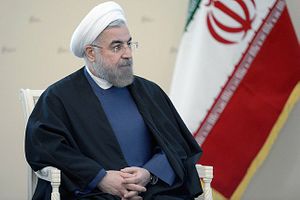On April 15, the Organization of Islamic Cooperation (OIC) issued a scathing communiqué criticizing “Iran’s interference in the internal affairs of the States of the region… and its continued support for terrorism.” Condemnation from the peak body of 57 Muslim states was an embarrassing development for Iran, given that it has been trying to present itself as the champion of Muslim interests. Yet the OIC was by no means the first regional body to chastise Iran this year. The communiqué echoed previous warnings from the Gulf Cooperation Council (GCC) and the Arab League in relation to Tehran’s support for Bashar al-Assad’s regime in Syria. The three bodies also labeled the Lebanon-based organization Hezbollah, Iran’s regional partner, as a terrorist group. A clear trend has formed: Iran is becoming more isolated in its own neighborhood.
This trend is particularly worrying for President Hassan Rouhani, who was elected in 2013 on the promise of restoring stability and responsibility to the region. Yet, almost three years into Rouhani’s drive to normalize Iran’s relationships with its neighbors, Iran remains as regionally isolated as ever.
Saudi Arabia’s hand is widely believed to be behind the OIC’s communiqué. Iran-Saudi relations have been difficult for at least three decades, but the Syrian Civil War has put the two regional rivals on opposite sides of the trenches. Each side has accused the other of interfering in the affairs of Syria. In 2015, Iran-Saudi relations took another nose-dive when hundreds of Iranian pilgrims perished in the Hajj disaster in Saudi Arabia.
The Saudi execution of the popular Shi’ite cleric Nimr al-Nimr in January 2016, and the subsequent mob attacks on the Saudi embassy in Tehran and consulate in Mashhad took these tensions to new heights. Saudi Arabia’s response to the events was blunt. The Saudi Foreign Minister declared at the GCC summit: “We cannot deal with a country that attacks and burns embassies…If it is a nation state, it should act like a responsible state. If not, it will be further isolated.” This message was endorsed by the GCC, demonstrating Saudi Arabia’s ability to advance its agenda in Muslim and Arab multilateral organisations to isolate Iran.
While concern about Iran’s regional reach are hardly new, fresh energy and determination is being devoted to containing Iran. This escalation of efforts to keep Iran’s ambitions in check reflects fears about the country’s expanding capacity to project power and influence in the wake of the November 2015 nuclear deal. The deal removes international sanctions on Iran in return for assurances that it will comply with a strict international inspection regime and refrain from militarizing its nuclear program. The deal was welcomed in Western (and many Asian) capitals. But, as we noted elsewhere, many of Iran’s neighbors do not share this enthusiasm. Iran’s regional critics fear that rather than stabilizing the Persian Gulf, the deal will give Iran a blank check to pursue its own objectives across the region, at the expense of Arab states.
These concerns are not entirely unfounded. The nuclear deal will see billions of dollars pumped into the Iranian economy. The Iranian Revolutionary Guards Corps (IRGC), the main architect of Iran’s regional military policies, will be a significant financial beneficiary, if only because it is a major stakeholder in the Iranian economy. Iran’s recent actions in the region have caused further unease. Just last month, the IRGC announced that it had carried out a ballistic missile test, drawing condemnation from the European Union and the United States, and sending shivers down spines in the Arab sheikhdoms in the Persian Gulf. In the eyes of Iran’s neighbors, the nuclear deal has fostered no shift in the country’s provocative policies. If anything, the deal has removed the economic pressures that had kept a lid on Iran’s regional ambitions. The depth of this concern was evident in a declaration by Bahrain’s foreign minister in October that Iran’s “actions are no less a threat to us than Daesh” (the Islamic State group).
As a result, Rouhani’s regional charm offensive has fallen largely on deaf ears. Rouhani’s assurances that Iran’s “army supports peace and stability” ring hollow when the IRGC and hardline Iranian factions spout the language of war. In particular, the disjuncture between Rouhani’s message of moderation and Iran’s involvement in the Syrian Civil War has created a perception that Rouhani either lacks the desire or the ability to moderate Iran’s regional behavior. While the latter is probably closer to the mark, because Iran’s military policy remains the purview of the Supreme Leader Ayatollah Ali Khamenei, it gives Iran’s neighbors little cause for comfort.
As a result, the regional tide continues to turn against Iran. Jordan has recently joined the list of countries that has recalled its ambassador from Iran “in protest of Iran’s interference in the domestic affairs of Arab countries.” With no end in sight for the Syrian Civil War, the combined impact of Iran’s renewed capacity and Saudi Arabia’s growing assertiveness implies a grim future. Although Rouhani has managed to make significant headway in resolving Iran’s relations with the United States and the international community, that success has adversely affected his ability to improve Iran’s image in its own neighborhood.
Prof. Shahram Akbarzadeh and Dara Conduit are based at the Alfred Deakin Institute for Citizenship and Globalization, Deakin University, Australia. They are the editors of Iran in the World (Palgrave 2016).

































